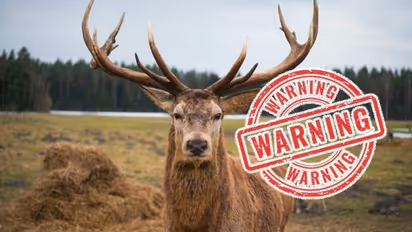Experts warn of rapid spread of 'zombie deer disease' with potential human infection risk

Synopsis
Concerns rise as Canada combats the spread of 'zombie deer disease' (chronic wasting disease), prompting urgent action amid fears of potential transmission to humans.
In recent weeks, Canadian scientists have expressed growing concerns about the spread of chronic wasting disease (CWD), colloquially referred to as "zombie deer disease," and its potential threat to human health. CWD is a contagious neurological condition affecting deer populations in the United States, and its presence has been confirmed in the Canadian province of British Columbia. This alarming development has prompted authorities to take immediate action to curb the spread of the disease and assess the risk of transmission to humans.
Chronic wasting disease is caused by misfolded proteins called prions, which lead to the degeneration of the central nervous system in infected animals. The disease manifests in affected deer as symptoms such as drooling, stumbling, lethargy, and a vacant stare, earning it the unsettling moniker of "zombie deer disease." The infection has been spreading rapidly among deer populations in the United States, with confirmed cases reported in Yellowstone National Park, marking the country's first instance.
In response to the confirmed cases in British Columbia, Canadian authorities have implemented a comprehensive strategy to combat the spread of CWD. The province has mandated the testing of road-killed deer, moose, elk, and caribou to monitor and detect potential cases swiftly. The proactive measures were initiated after two cases were confirmed at the end of January, underscoring the urgency of addressing the situation.
Also read: What is Prion disease? Can 'Zombie Deer disease' affect humans? What are its symptoms?
While health officials in Canada have stated that there is currently "no direct evidence" of chronic wasting disease transmitting to humans, concerns persist over the potential risk.
Hermann Schatzl, a researcher from the University of Calgary's veterinary school, highlighted that previous research on macaques suggests the possibility of transmission between primates. Although there is no documented case of humans contracting the disease from consuming venison, Schatzl emphasized that the risk cannot be ruled out entirely.
"In our experimental models, it's very likely that CWD can infect humans. Has it ever happened before? There is no positive evidence where you can say a human had this prion disease from the consumption of venison. But will it happen in the future? Very likely, yes," he told The Guardian.
The emergence and spread of chronic wasting disease in Canadian deer populations have sparked heightened vigilance among scientists and officials. The swift response in British Columbia reflects the urgency of addressing the potential threat to both wildlife and human health. As researchers continue to investigate the dynamics of CWD and its potential transmission to humans, the situation serves as a stark reminder of the importance of proactive measures and ongoing surveillance to safeguard against emerging infectious diseases.
Check the Breaking News Today and Latest News from across India and around the world. Stay updated with the latest World News and global developments from politics to economy and current affairs. Get in-depth coverage of China News, Europe News, Pakistan News, and South Asia News, along with top headlines from the UK and US. Follow expert analysis, international trends, and breaking updates from around the globe. Download the Asianet News Official App from the Android Play Store and iPhone App Store for accurate and timely news updates anytime, anywhere.